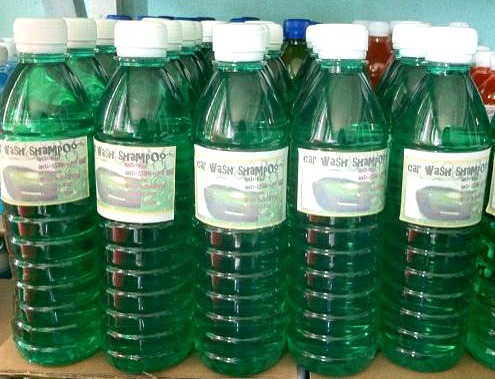 Car Shampoo is one of the in-demand products in the market because of the fast growing numbers of Car Wash business nowadays. To get started in car-shampoo making, you will need roughly P3,000 in initial capital. You will need it to purchase the ingredients, utensils, and equipment listed below.
Car Shampoo is one of the in-demand products in the market because of the fast growing numbers of Car Wash business nowadays. To get started in car-shampoo making, you will need roughly P3,000 in initial capital. You will need it to purchase the ingredients, utensils, and equipment listed below.
How to make Car Shampoo
Ingredients:
- 80 g Needle-type coconut fatty alcohol sulfate (CFAS)
- 840 g De-ionized water or distilled water
- 30 g Coco diethanolamide (CDEA)
- 1 g Phenoxy ethanol
- 2 g Ethyl alcohol
- 10 g Emulsified carnauba wax
- Water-soluble dye
- 4 g Fragrance
- 20 g Industrial salt
Utensils and equipments:
- Mixing bowl
- Plastic ladle
- Funnel
- Plastic jigger
- Weighing scale
- 4 pcs. 250 ml-opaque bottles for packaging
Procedures:
STEP 1: Pour the de-ionized water in the mixing bowl and heat on medium fire until it becomes steaming hot. With the use of a ladle, add and mix the CFAS into the steaming water. Using the needle-type CFAS rather than the powder type is preferred to give the end-product a clearer texture. Powder CFAS is usually used in making powder detergent; if used in liquid wash or shampoo, on the other hand, it would give the shampoo a cloudy texture.
When mixing the CFAS into the steaming hot water, stir slowly so the mixture does not bubble up. The appearance of a few bubbles is acceptable, though.
STEP 2: With the CFAS thoroughly mixed in and with the mixture still steaming hot, turn off the fire and remove the mixing bowl from the stove. Make sure that the CFAS is dissolved completely, then add to the mixture the CDEA, phenoxy ethanol, ethyl alcohol, emulsified carnauba wax, and the fragrance—in that order. Before adding another ingredient into the mix, make sure to mix each ingredient thoroughly into the mixture. (Because very few chemical shops sell emulsified carnauba wax, you may use plain carnauba wax instead; it sells for P500 per 1/2 kg.)
Set the mixture aside.
STEP 3: In a separate jigger, dissolve the water-soluble dye in water. The darker you want the shampoo to be, the more dye you should use. Once the dye is completely dissolved, add and mix it into the mixture you were working on.
STEP 4: Add the industrial salt gradually. The industrial salt serves as a thickener. The consistency of the mixture must be slimy or a bit thick. When suds start to form, it means that the thickening effect of the salt is taking place. Some 20 grams of industrial salt is enough to produce the right consistency for this process. However, before pouring in the rest of the salt into the bowl, it is advisable that you dissolve first a little portion of the salt—perhaps a pinch—into a small container holding the mixture. You have to dissolve a little portion of the salt into the mixture at a time, and check the consistency. Dissolve another portion until you atain the right consistency.
Excessive salt will make the mixture thick for a while, but the consistency would eventually revert to its original state. If this happens, do not throw away your mixture. Instead, make another bowl of mixture with the right consistency—slimy or a bit thick but not totally thick—using using the right amount of industrial salt, then just gradually add some of the inaccurately measured mixtures.
Once you are through mixing all of the ingredients, let the car shampoo cool down. When it gets cool, pour the mixture—it is now a shampoo—into the opaque bottles using a funnel. This recipe will fill four 250-ml bottles or two 500-ml bottles. The shelf-life of this product is two years.
What each ingredient does to your product:
- CDEA – foaming or suds booster
- Industrial salt – thickening agent, to make the product viscous
- CFAS – surfactant, the main cleaning agent
- Phenoxy ethanol – a preservative that is also used in cosmetics
- Carnauba wax – comes from the leaves of the carnauba palm. It is also use in cosmetics, polishing products, and baking.
Dos and don’ts:
- Use the utensils exclusively for producing car shampoo. Never use the same utensils for cooking.
- Keep the materials out of children’s reach.
- Store both the raw materials and the finish products in dry cool place.
- Measure the materials precisely and accurately.
WHERE TO LOOK FOR SUPPLIES:
Everlight Chemiecolor Enterprise
461 Clavel St., Brgy. San Nicholas,
Binondo, Manila, Philippines
Tel. No.: (02) 8242-6934 / (02) 7728-6556
Mobile: 0933-9359038 (SUN)
Email: [email protected]
Visit Website (This link will open on a new window)